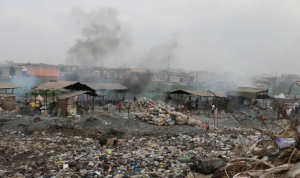“If organic wastes were a country, it would be the third-largest contributor to global warming in the world” (FAO, Food, et al: Food Wastage Footprint and Climate Change, 2015).
The stench of several towering man-made stacks hangover workers in what seems to be a city, measured by land area. These towering stacks were components of materials once cherished in homes, residences, communities, businesses and no longer needed. Much of which attracts all sorts of vermin – bugs, insects, flies – birds, children, men, and women; and a decomposing portion – 45-55% pile known as organic waste like Olusosun landfill in Lagos Nigeria. These organic wastes are easily biodegradable; they consist of food waste, green waste (yard), wood waste, etc. Their origin is from plants and animals excluding petroleum-based materials. They are a valuable resource for material and energy recovery when processed biologically. However, in Nigeria, these resources are not fully tapped.

Food loss and waste
The term organic waste particularly food waste has gained lots of global attention due to its contribution to greenhouse gases (GHGs). The UNEP and WRAP report reveals that 17% of all food wasted in homes, restaurants, and shops is dumped without separation. The food waste ends up in landfills, giving off methane (CH4), a gas 28 times potent than CO2, thus feeding climate change. In developing countries like Nigeria, much organic waste also comes from food loss and waste in farms and the supply chain. Five percent of global greenhouse gas emissions are associated with 40% of preventable food loss and waste in Nigeria. Inadequate processing and storage facilities, bad roads, a poor partnership between farmers and the markets has resulted in heavy losses compared to developed countries where food waste is due to the abundance and cultural habits.

Organic waste and pollution
Indiscriminate dumping of organic waste has resulted in land, water, and air pollution. Organic waste generates unpleasant odours and helps rats, flies, bugs, and mosquitoes multiply and spread diseases when disposed of improperly. Organic waste in landfills can infiltrate rainwater, producing leachate of the high BOD. Groundwater, surface water, or other water bodies contaminated by leachate, experience oxygen depletion and the killing of aquatic organisms. Besides methane, organic waste decomposition can result in the production of carbon dioxide, CO2, nitrogen dioxide, NO2, hydrogen sulfide, H2S, and other trace gases. Hydrogen sulfide is a toxic gas that can cause eye and nasal irritation in humans, affect plant growth, and damage infrastructure due to acid rain. Production of hydrogen sulfide also results in an unpleasant odour, an environmental nuisance. Nitrogen oxide may cause inflammation of the lung tissue and at higher levels cause death.
Benefits of diverting organic waste from landfills
Collection and processing of organic waste into valuable resources has environmental, social, and economic benefits. Such benefits include greenhouse gas emissions, reduction in leachate production, and management costs. Reduction in landfill safety risks for workers and scavengers, decrease nuisances, and contribution to land preservation/farming are some of the social benefits of diverting organic waste from landfills. The economic benefits include landfill life extension, reduction of harmful emissions, costs and energy savings from chemical fertilizer replacement, and new job opportunities.

Changing the Paradigm
Addressing the 45-51% pile will require Nigeria to have accurate data on organic waste quantification. Waste data can be collected at the facility before processing depending on whether a centralized or decentralized collection and treatment system. Clear and accurate data will help policymakers and planners develop a robust system for organic waste management.
In addition, an organic waste collection and treatment framework that includes source waste separation and decentralized treatment system (for large cities) or centralized system (for small communities) will be beneficial economically and environmentally. It is imperative to promote public awareness on source separation of waste for the sustainability of the framework.
Adopting current technologies in aerobic and anaerobic composting for unpreventable organic waste will divert organic waste from landfills and incinerators. Using organic waste as a resource ensures that less of other raw materials are needed for production purposes, which is key in a circular economy. A unique technology that addresses the challenges in composting – odour, space, and long composting time – is currently in the market. This technology accelerates the bioconversion of organic waste into compost, eliminates odours in the process, and increases the facility capacity. Compost material can be used substitute for inorganic fertilizer or used for soil amendment. This can also open new opportunities economically and environmentally. The focus should also be on reducing food waste and other preventable organic waste to ensure stable food security and reduce the waste burden on the environment. Private and public investment in food processing, storage and preservation technologies to cut down food loss and waste should be encouraged. The development of infrastructures in the transport system is also vital.
With commitment from private-public institutions, the general public, and all stakeholders, Nigeria’s 45-51% pile is set to become a commodity in demand rather than a waste to put away.






